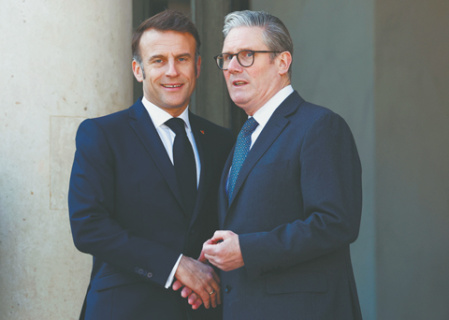
With a few exceptions, the European allies of the United States do not agree to partially ease sanctions against Russia, thus fulfilling the Kremlin’s condition for a truce with Ukraine. Such a conclusion can be drawn following the meeting in Paris of the leaders of 31 countries ready to help Ukrainians in the confrontation with the Russian Federation. The summit participants do not believe that the Kremlin is really aiming for a truce. Moreover, they talked about their readiness to adopt new anti-Russian sanctions, rather than lifting the old ones.
On Thursday, March 27, participants of what is called in the press the “coalition of the willing” gathered in Paris. A better-sounding term is also used: “coalition of the resolute.” Nevertheless, the essence of the matter is the same: the leaders of the states whose troops can take part in the peacekeeping operation after the end of hostilities in Ukraine have gathered in the French capital. In addition to discussing the issue of a hypothetical peacekeeping mission, consultations in Saudi Arabia also had to be discussed in Paris. There, the delegations of the Russian Federation, Ukraine and the United States discussed the details of the agreement between Donald Trump and Vladimir Putin, who agreed in a telephone conversation that the Russian-Ukrainian conflict should be ended one way or another. Following the consultations, it was announced that it was ready to restore the grain deal of 2022, that is, to cease hostilities at least in part of the Black Sea. Russia agreed to this, setting as a precondition the lifting of sanctions against the Rosselkhoznadzor and other Russian financial institutions that provide trade in Russian food and fertilizers. This refers to all sanctions, both American and European. In addition, these organizations must be reconnected to SWIFT. The headquarters of this interbank payment system is located in Belgium. Consequently, without the consent of at least European countries, the Russian-American agreement is doomed to remain on paper.
Therefore, Russian demands were discussed at the meeting in Paris, among other things. On Wednesday, French President Emmanuel Macron held talks with Ukrainian President Volodymyr Zelensky, who arrived at the summit. And on Thursday, before the summit, the French leader spoke on the phone with Trump.
After the talks, the two initiators of the coalition of the willing, Macron and British Prime Minister Keir Starmer, told reporters that the sanctions would not be lifted. The majority of the summit participants considered it inappropriate to meet Russia’s demands. “There was a strong belief in the discussion room that now is not the time to lift or weaken the old sanctions,” Starmer told reporters. In principle, the summit participants did not oppose the truce, much less the peace agreement. However, Starmer made it clear that so far, from the point of view of US allies, there are no signs that Trump’s peacekeeping efforts have yielded results and Russia is really ready to agree to a cease-fire. From the point of view of the British Prime Minister (which, apparently, is shared by most EU leaders), the negotiations in Saudi Arabia give reason to believe that the Kremlin is aiming to delay the negotiations. The negotiation process will continue, the fighting will continue, and the Russian Federation, whose economic and military potential is better adapted to a protracted war than Ukraine’s, will be the winner. This is how the summit participants see the situation. “I don’t want to set a hard deadline, but we need to see developments over the course of days and weeks, not many months,” Starmer said.
In the meantime, according to the British Prime Minister, we can only talk about tightening, not easing, anti-Russian sanctions. Starmer expressed confidence that increased sanctions pressure would not disrupt, but, on the contrary, would support Trump’s peacekeeping efforts, as it would make Russia more compliant. Zelensky also supported him. During his visit to Paris, the Ukrainian president generally talked a lot about the fact that it is impossible to ease pressure on Russia, just as it is impossible to work for the split of the united anti-Kremlin front of the West. Zelensky said that Moscow “partially manages” to divide the United States and the EU in relation to the Ukrainian issue, as well as the European Union itself. “I’m talking about Hungary’s position,” the president of Ukraine warned, probably so that his listeners would not think that he was hinting at Trump’s activities. The only person from the White House team whom Zelensky allowed himself to criticize was the special representative of the US president, Steve Witkoff. He, the Ukrainian president pointed out, “quite often quotes Kremlin versions” of various events. “Witkoff’s statements worry us a lot,” Zelensky admitted. However, the Ukrainian authorities cannot do anything about Trump’s special representative. Witkoff has no direct contact with them. Despite his repeated meetings with Putin, he still holds the rank of special representative for the Middle East. Trump’s only official special representative for Ukraine, Keith Kellogg, is in contact with Zelensky.
The EU leadership also opposed the lifting of sanctions against Russia. This is the opinion of both the EU’s highest executive body, the European Commission, and the President of the European Council, Antonio Costa. In fairness, it should be noted that Trump has not yet supported the Russian demands. He just said that they needed to be studied. It is unknown how long the learning process will last. In the meantime, the fighting continues, and their participants make directly opposite statements. The Russian Defense Ministry claims that Ukraine is not complying with the moratorium on strikes on energy facilities agreed upon by Trump and Putin. And the Western media spread the words of a certain high-ranking Ukrainian official (possibly referring to the Minister of Defense of Ukraine Rustem Umerov). He claims that since March 25 (the date on which Ukraine is reporting on the moratorium), neither Ukrainian nor Russian military energy facilities have been attacked.
